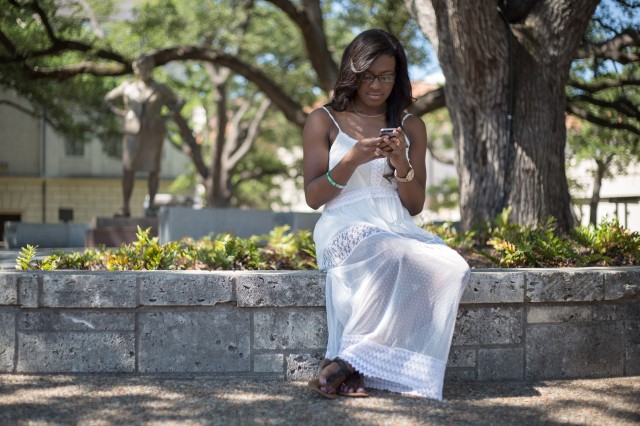Hashtags Divide UT’s Black Community
By Keneshia Colwell
Reporting Texas

UT junior Taylor Turner sees the #teamlightskin #teamdarkskin phenomenon as a divisive fad, undermining more critical questions about race in America. Photo by Martin do Nascimento.
On the University of Texas at Austin campus, some black students are debating the use of Twitter hashtags like #teamlightskin and #teamdarkskin, with many worrying that the hashtags have driven a wedge between students with different skin tones.
At least three events were held by African American organizations over the spring to address concerns about divisions within the university’s black community, including the use of the hashtags. The events included an open discussion in April, entitled “Internalized Racism: Blacks to Blacks,” sponsored by Umoja, a women’s empowerment organization, and the Student African American Brotherhood. Other meetings were held earlier in the spring, one by the Alpha Kappa Alpha sorority and a third by the Black President’s Leadership Council.
The conflict was over Twitter hashtags — specifically, the hashtags #teamlightskin and #teamdarkskin – that have been popular nationally among black Twitter users in the spring 2014 semester. UT’s black community has raised awareness of the troubling roots and deeper significance of skin tone; many students previously thought the use of #teamlightskin and #teamdarkskin was simply light-hearted banter. But others have seen the issue in a very different light, as a symbol of self-hatred.
The events held by the black organizations have been applauded by students like Taylor Turner, a UT junior studying political journalism, who said the university’s black community has been doing its part to minimize divisive conversation among black students.
“We’re showing the community the emotional effects of division between one another, starting right here with our own students and this influential black college population,” Turner said.
Several students said that in the two months since the issue peaked in February, the number of tweets and posts about the light-skinned/dark-skinned controversy has fallen significantly. Turner said the UT events have helped students here realize how harmful their remarks about skin tone can be.
“Like any other fad, this too was just something that blew over,” Turner said. “I think people have realized it shines a negative light on those who embrace this superiority, but also exposes an ignorance about us as a people for playing into [the stereotype] so much.”
But just because these hashtags’ popularity has peaked doesn’t mean the discussion about skin tone and feelings of superiority and inferiority has ended. Addressing these issues is an important part of developing a more unified black community at UT, Turner said.
“We’re far more powerful together than we are divided; the sooner we realize that, the better off we’ll be,” she said. The emotion students showed about the hashtags surprised Chloe Airhart, a senior and the program chair of the Alpha Kappa Alpha event.
“I never actually thought about how much this really bothered people until I could hear the passion in their voices, which encouraged others to speak up,” Airhart said. “It was beautiful.”
Chelsea Jones, 21, a junior social work major from Dallas, said after attending Umoja’s open discussion on internalized racism that she did not believe it or any other event would change the constant divide in the black community. But, she added, it was an eye opener.
“But we need to take it upon ourselves to change our minds,” Jones said. “The change has to start with us, aside from the natural divide we were conditioned to believe was right as children.”
That divide has much deeper meaning than meets the eye, scholars of racial issues say. Though the use of hashtags on a social network may appear trivial, one expert says #teamlightskin and #teamdarkskin are part of a strain of self-hatred based on skin color dating back more than 200 years.
Darren Kelly, a postdoctoral fellow in UT’s Division of Diversity and Community Engagement who focuses on Africa and African diaspora studies, said the skin tone issue derives from the era of African American enslavement, when fair-skinned slaves were treated better than those with darker skin tones.
“Lighter-skinned African Americans have had the upper hand since slavery, staying in the house, with more desired features resembling and meeting European beauty standards, which often does not favor the features of most African Americans with dark skin,” Kelly said.
Some young black students have extended the racial designations to social media behavior, using the term “light-skinned” to describe poor etiquette. Quinlin Jones, a UT senior who is active on Twitter, Facebook and Instagram, said people whose behavior is described as “light-skinned” often have social media comments and texts piling up without any plans of replying to them.
“Really, it’s just about making themselves [lighter-skinned black girls] superior and having the right to be selective about who they have time for just because they’re the preferred skin tone, when it comes to beauty standards,” Jones said.
In response to the #Teamlightskin hashtag, some Twitter uses adopted a #Teamdarkskin hashtag to celebrate darker skin tones.
Alicia Johnson, a 2013 UT graduate who is still actively involved in the University’s black community, describes herself as a proud member of #Teamdarkskin.
“I’ve always felt a divide amongst black people who are particularly lighter in skin tone on campus, but it makes me no difference since I’m in love with all parts of me, especially my skin tone,” Johnson said.